|
|
|
Sort Order |
|
|
|
Items / Page
|
|
|
|
|
|
|
| Srl | Item |
| 1 |
ID:
132308
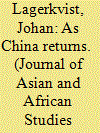

|
|
|
|
|
| Publication |
2014.
|
| Summary/Abstract |
This article investigates how perceptions of China in Mozambican civil society are affected by entrepreneurial activity and bilateral cooperation between China and Mozambique - real, imagined, visible and legal as well as clandestine and illegal in the agricultural and forestry sectors. The research problem concerns how discourse on Chinese investors is formed in Mozambique. Two questions are posed. How does Mozambican civil society perceive their room to maneuver at a time of Chinese growing economic interest and 'return' to Africa? What views exist on the policy space for the national government? Using qualitative ethnographic interviews to answer these overarching questions about expanding/contracting maneuvering space, this article explains how Mozambique's largest social group - peasants - the National Association of Small Farmers (UNAC) and other societal actors perceive Chinese investors. Informed by theoretical debates on civil society, the article argues that coinciding with China's large-scale return to Africa, an already tense dynamic between civil society and the state is picking up speed. It is argued that this phenomenon is likely to have more to do with African governments accruing more power and policy space than through direct impact of Chinese economic activity on African social life. However, to avoid negative discourse formation, China and host governments need to become more open on and transparent about bilateral agreements.
|
|
|
|
|
|
|
|
|
|
|
|
|
|
|
|
| 2 |
ID:
133482
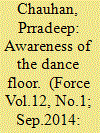

|
|
|
|
|
| Publication |
2014.
|
| Summary/Abstract |
As the world entered the last couple of decades of the 20th century, the sharply differing views and reactions of India and the United States (US) to unfolding global and regional events had brought bilateral relations to almost the nadir of the Nixon years. As James Heitzman and Robert L. Worden, the Washington-based editors of India: A Country Study have recorded (http://www.countrystudies.us/india/134.htm), "In the 1980s the Indian and United States governments had divergent views on a wide range of international issues, including Afghanistan, Cambodia, the Middle East, and Central America. Serious differences also remained over the US policy toward Pakistan and the issue of nuclear proliferation. India was repeatedly incensed in the Eighties when the US provided advanced military technology and other assistance to Pakistan despite the US' concerns about Pakistan's covert nuclear programme. For its part, Washington continued to urge New Delhi to sign the Treaty on the Non-Proliferation of Nuclear Weapons and, after the successful test launch of the Indian Agni intermediate-range ballistic missile in May 1989, called on New Delhi to refrain from developing a ballistic missile capability by adhering to the restrictions of the Missile Technology Control Regime". This unhappy prelude makes the vibrancy of the India-US bilateral defence relationship in general (and the maritime relationship in particular) over the very next decade all the more striking.
|
|
|
|
|
|
|
|
|
|
|
|
|
|
|
|
| 3 |
ID:
062408
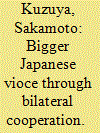

|
|
|
| 4 |
ID:
130609
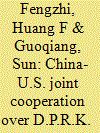

|
|
|
|
|
| Publication |
2014.
|
| Summary/Abstract |
In February 12, 2013, North Korea announced it had successfully Conducted its third underground nuclear test. After such a dangerous move, the U.S. and South Korea tightened their bilateral security cooperation and beefed up defense measures. This caused tensions to escalate on the Korean Peninsula, and the situation appeared to spin out of control. The crisis pushed China and the U.S. together to work on this issue. This article will analyze those deep-seated factors affecting bilateral cooperation and make an initial exploration 'of its prospects while providing an overview of their joint actions to solve the North Korean nuclear issue.
|
|
|
|
|
|
|
|
|
|
|
|
|
|
|
|
| 5 |
ID:
104222
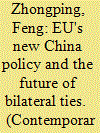

|
|
|
|
|
| Publication |
2011.
|
| Summary/Abstract |
This article forecasts the future of bilateral ties by examining the recent readjustments in the European Union's China policy. It highlights the EU's interest in a closer bilateral cooperation focusing on pragmatism and an integrated approach to China by EU member states. The future of bilateral ties will hinge on whether the two sides can seize the current opportunity to expand complementary areas in their economies while curbing competition.
|
|
|
|
|
|
|
|
|
|
|
|
|
|
|
|
| 6 |
ID:
133596
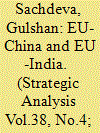

|
|
|
|
|
| Publication |
2014.
|
| Summary/Abstract |
More than a decade has passed since the European Union (EU) signed strategic partnerships with China (2003) and India (2004). The EU's 'honeymoon' with China was over within a few years while cooperation on truly strategic issues with India is yet to emerge. The core of both these relationships is still economics. While China has taken full advantage of the EU's institutional mechanism through more than 56 sectoral dialogues to promote its geopolitical goals and also to neutralise European concerns about democracy and human rights, Indian policy makers and analysts remain sceptical about Europe's role in global affairs. As a result, they have not bothered to use European capacities to promote their own interests through this partnership.
|
|
|
|
|
|
|
|
|
|
|
|
|
|
|
|
| 7 |
ID:
111678
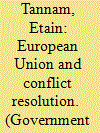

|
|
|
|
|
| Publication |
2012.
|
| Summary/Abstract |
The aim of this article is to determine the EU's effect on British-Irish and Greek-Turkish cooperation. It examines the EU's actual and potential role in fostering British-Irish and Greek-Turkish cooperation as well as its policies to Northern Ireland and Cyprus themselves. Domestic bureaucratic capacity and institutional design are put forward as explanations for the success of the British-Irish relationship rather than EU membership per se. In the case of Cyprus, the article suggests that increased bilateral cooperation with respect to disputed territory is unlikely to occur in the absence of faster bureaucratic change in both Greece and Turkey. EU membership is not a causal factor in the evolution of cooperation and conflict resolution.
|
|
|
|
|
|
|
|
|
|
|
|
|
|
|
|
| 8 |
ID:
133597


|
|
|
|
|
| Publication |
2014.
|
| Summary/Abstract |
At first glance, there was no coherent regional and international response to the transitions triggered in the Arab world since December 2010 as external players, both regional and international, had to confront with unceasing alarm the rapidity of change threatening to unravel in critical Arab states. However, as events in the region progressed, a pattern emerged to the external responses, one that was as predictive as it was differentiated. This was exemplified by the counter-revolutionary forces that were assembled against the transition in Bahrain on one hand, and the aggressively interventionist posture adopted towards Libya and Syria on the other. This inconsistency between activism and support for the supposedly democratic spirit of armed resistance groups, but inaction and silence towards the crushed non-violent public opposition elsewhere, clearly betrayed the interest-driven motivations of the external actors involved.
|
|
|
|
|
|
|
|
|
|
|
|
|
|
|
|
| 9 |
ID:
147890
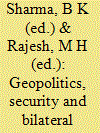

|
|
|
|
|
| Publication |
New Delhi, Vij Books India Pvt Ltd, 2017.
|
| Description |
viii, 146p.hbk
|
| Standard Number |
9789385563836
|
|
|
|
|
|
|
|
|
|
|
|
Copies: C:1/I:0,R:0,Q:0
Circulation
| Accession# | Call# | Current Location | Status | Policy | Location |
| 058841 | 327.15405195/SHA 058841 | Main | On Shelf | General | |
|
|
|
|
| 10 |
ID:
129430
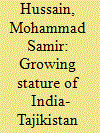

|
|
|
|
|
| Publication |
2014.
|
| Summary/Abstract |
'Tajikistan is a key partner of India in the Central Asian region' - Indian Prime Minister, Manmohan Singh, September 2012
The end of the Cold War, witnessed a dramatic transformation in the world order. India has concluded strategic partnership agreements with various regional and global partners such as the United States, Russia, France, Japan, Kazakhstan, Afghanistan, Uzbekistan etc. Tajikistan became the latest country to have concluded the strategic partnership agreement with India and the third among the Central Asian Republics (CARs) after Kazakhstan and Uzbekistan. The post-Cold War global strategic developments have brought India and Tajikistan closer to one another. Strategic partnership agreement makes a lot of sense when Tajikistan is considered India's gateway to Central Asia. Strategic partnership agreement is part of India's foreign policy goals to strengthen its presence in areas of interest to India and gaining
more strategic space. The agreement was signed during the visit of the President of the Republic of Tajikistan, Emomali Rahmon to India in September 2012. It was important in a way that it elevated the old close normal bilateral ties to strategic level. With this, both sides can now engage in a robust manner. The strategic importance of this partnership lies in sharing common perspectives on several international
and regional issues. In the 21st century, both sides would like to establish qualitatively new and mutually beneficial relations in the political, economic, military, development cooperation and in other areas.
|
|
|
|
|
|
|
|
|
|
|
|
|
|
|
|
| 11 |
ID:
133674
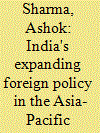

|
|
|
|
|
| Publication |
2014.
|
| Summary/Abstract |
A major feature of India's foreign policy in the post-Cold War era has been its increasing economic, political and strategic engagement with the Asia-Pacific region, a process that began in the 1990s as India's "Look East Policy". However, New Delhi's eastward expansion, despite sharing many commonalities with New Zealand, has not yet resulted in any substantial relationship with Wellington, be it in the field of politics, economic or defence/security. Despite attempts taken in the last two decades, India's engagement with New Zealand in terms of overall bilateral relationship is still untapped. There is ample scope for these two countries to collaborate and engage themselves in a wide-range of issues encompassing economic, political and strategic aspects of their bilateral relationship, with focus on a closer security partnership to deal with the emerging challenges from traditional and non-traditional threats in the region.
|
|
|
|
|
|
|
|
|
|
|
|
|
|
|
|
| 12 |
ID:
123822
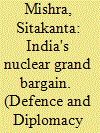

|
|
|
| 13 |
ID:
133598
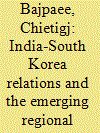

|
|
|
|
|
| Publication |
2014.
|
| Summary/Abstract |
South Korean president Park Geun-hye visited India in January 2014 after India and South Korea marked 40 years of diplomatic relations the previous year.1 These developments symbolise a burgeoning relationship between two of Asia's leading economies and democracies. However, they have added significance as Asia undergoes a shift in the strategic balance of power. This has been prompted by the US rebalance or strategic pivot towards Asia, the rise of China and its proclivity to adopt a more assertive position on regional issues, and the emergence of the 'Indo-Pacific' as a new geopolitical frame of reference. In this context, rising Asian powers such as India and South Korea hold an increasingly significant place in meeting the region's development and security objectives.
|
|
|
|
|
|
|
|
|
|
|
|
|
|
|
|
| 14 |
ID:
134052
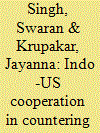

|
|
|
|
|
| Publication |
2014.
|
| Summary/Abstract |
The increasing dependence on Information and Communication Technologies (ICTs) has unleashed a whole new genre of cyber terrorism. Cyber attacks on critical infrastructure, online hate propaganda and use of the internet for recruiting, planning and effecting terrorist attacks have become new frontiers of terrorism. The ubiquitous cyberspace has expanded terrorism structures and transformed their operations. Given their democratic traditions of privileging basic freedoms, such as individual privacy, and the unprecedented spread of the internet, India and the US face a formidable challenge in confronting cyber terrorism. While both countries share a strong political affinity to cooperate and have set up institutional mechanisms to secure cyberspace, divergences in their approaches and a lack of clarity and consensus on their immediate and long-term goals continue to be their fundamental limitations. In spite of their strong commitment to work together, their divergent approaches to internet governance and episodes like the WikiLeaks and Snowden affairs have only re-enforced their continuing trust deficit.
|
|
|
|
|
|
|
|
|
|
|
|
|
|
|
|
| 15 |
ID:
130600
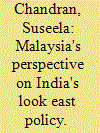

|
|
|
|
|
| Publication |
2014.
|
| Summary/Abstract |
The year 2012 completed 20 years of India's Look East Policy (LEP). Launched by former Indian Prime Minister P.V. NarashimeRao in 1992, this policy had its genesis in the end of the cold war following the collapse of the Soviet Union. To India, this policy was more than just a foreign policy alternative as it provided a development alternative as well, in synchronization with the globalization paradigm and the resurgence of Asia as an economic powerhouse. The 1990: saw a period rapid economic development and growth of Asian countries - especially Southeast Asia. With the abrupt collapse c the Soviet Union in 1991, India was left 'deprived' (the Soviet Union was lndia's strongest partner), and started to seek new markets t~
fuel its own economic growth. Thus Indian Prime Minister at the time P.V. Narasimha Rao, came up with the concept of a "Look East Policy for India. This was a policy of economic engagement with Southeast Asia and East Asia, to achieve two objectives. First was to encourage trade links with individual partners, and second, to provide foreign employment for India's own expanding work force (R.P. Khanna, 1991,6-7).
|
|
|
|
|
|
|
|
|
|
|
|
|
|
|
|
| 16 |
ID:
131260
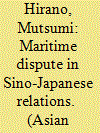

|
|
|
|
|
| Publication |
2014.
|
| Summary/Abstract |
My aim in this article is to shed light on some domestic dimensions of the maritime dispute between China and Japan in the East China Sea, in particular those of the Japanese side. The domestic dimensions are important because many actors are involved and the dispute is multidimensional. We may need to set longer time frames in order to find exit strategies and at least mitigate the influence of this seemingly intractable dispute. I suggest mid- to long-term alternative approaches to resolving it.
|
|
|
|
|
|
|
|
|
|
|
|
|
|
|
|
| 17 |
ID:
127833
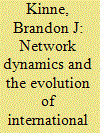

|
|
|
|
|
| Publication |
2013.
|
| Summary/Abstract |
Cooperation helps states realize mutual gains, but mistrust and disagreements over institutional design inhibit cooperation. This article develops a network explanation for how states achieve cooperation in the face of persistent coordination and collaboration problems. The analysis focuses on bilateral cooperation agreements, a vast body of treaties spanning multiple issue areas. Bilateral agreements constitute an evolving network of cooperative ties. This network defines the strategic environment in which states bargain over new agreements, endogenously influencing subsequent bilateral endeavors by revealing strategically valuable information about states' trustworthiness and preferences over institutional design, while also generating externalities that incentivize bilateral partnerships. Inferential network analysis shows that states are more likely to create bilateral agreements if they (1) share agreements with common third parties, (2) accede to more agreements in general, and/or (3) share important exogenous characteristics with current bilateral partners. These network dynamics drive bilateral cooperation in everything from commodities to cultural exchange to fisheries.
|
|
|
|
|
|
|
|
|
|
|
|
|
|
|
|
| 18 |
ID:
137476
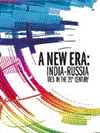

|
|
|
|
|
| Publication |
Moscow, Rossiyskaya Gazeta, 2015.
|
| Description |
174p.Hbk
|
| Standard Number |
9780988841932
|
|
|
|
|
|
|
|
|
|
|
|
Copies: C:1/I:0,R:0,Q:0
Circulation
| Accession# | Call# | Current Location | Status | Policy | Location |
| 058180 | 327.540947/FET 058180 | Main | On Shelf | General | |
|
|
|
|
| 19 |
ID:
134370


|
|
|
|
|
| Summary/Abstract |
Afghanistan is often mentioned as a threat to the Central Asian states. Potential spillovers of violence, extremism, terrorism and dangers related to the drug trade are seen as significant security issues for the region. This article takes a different approach. Taking a performative view of statehood, we see state identities as socially constituted, partly by involvement in regional and global processes. From research on border management, the Northern Distribution Network, and various forms of bilateral cooperation between Afghanistan and the Central Asian states, we argue that Afghanistan has become an arena where the Central Asian states can participate. How the Central Asian states bordering on Afghanistan are treated as relevant participants, regardless of actual state capacity or the effectiveness of their policies, serves to constitute and confirm their sovereignty and relevance to the international community, and ultimately their statehood. By emphasizing the important state effects of their performance, our perspective differs from accounts of Central Asian states as either ‘weak’ or ‘strong’, and the tendency to depict Central Asian engagement in regional initiatives as mere window-dressing.
|
|
|
|
|
|
|
|
|
|
|
|
|
|
|
|
| 20 |
ID:
133521


|
|
|
|
|
| Publication |
2014.
|
| Summary/Abstract |
Bangladesh and Myanmar share both land and maritime borders, and have age-old commercial and cultural ties. These two close neighbours have unlimited potentials in mutual cooperation in trade, connectivity and people to people contact. Both geostrategic and geoeconomic viewpoints justify the necessity of strong Bangladesh-Myanmar relations. Nevertheless, they have failed to best utilise their proximity and historical ties for economic and strategic gains. Since the establishment of the diplomatic tie in 1972, the relations have not always been smooth due to lack of political will especially from the Myanmar government, mutual misperceptions and suspicions. The Rohingya refugee issue, tensions in border and transnational crimes have been the key impediments to a meaningful bilateral relation. As consequences, many vital bilateral agreements and MoUs are pending. It is a reality that friends or allies may be changed but not neighbours. Therefore, the best interests of these close neighbours lie in exploring potential areas of cooperation and prosper together. This paper identifies several potential areas of mutual cooperation to explore and argues that for attaining a new height in Bangladesh-Myanmar relations, failure in resolving any hard issue such as the refugee issue should not be allowed to leave any negative impact on other prospective areas. Exploring the potential areas and trying to resolve the key disputes through various channels can be done simultaneously. For greater friendship, removing suspicions and opening up minds are imperative for these neighbours.
|
|
|
|
|
|
|
|
|
|
|
|
|
|
|
|
|
|
|
|
|